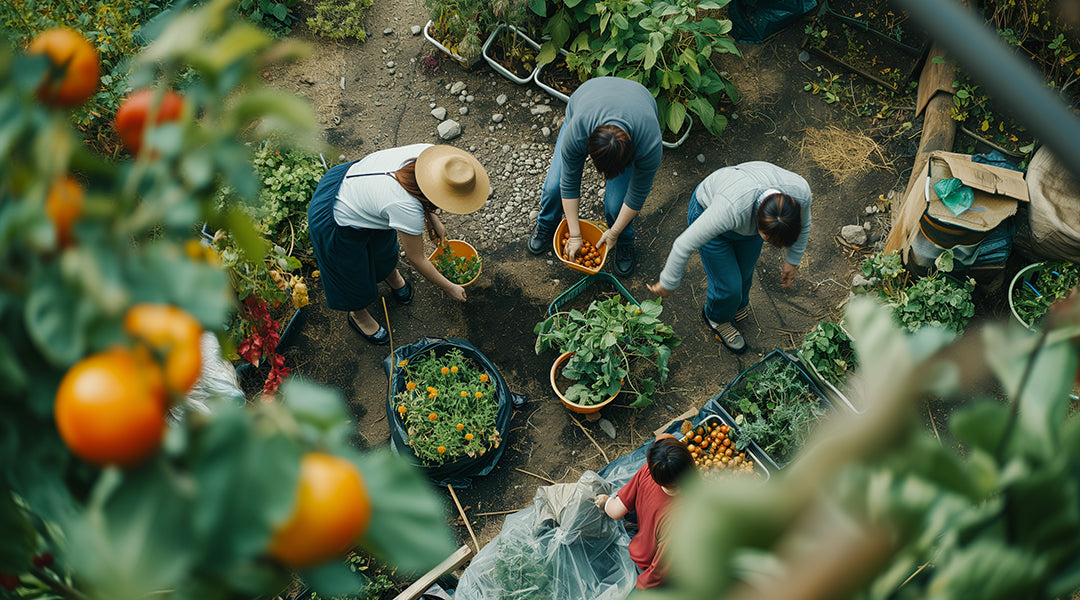
Organic Farming Practices - What Are They, Why Are They Important, And How Can You Support Them
Key Takeaways
- Organic farming prioritizes growing quality foods/coffee while protecting and preserving the planet and its resources.
- Organic farming omits and/or prohibits any use of harsh chemicals (or GMOs).
- Organic farming is needed for planetary preservation and health.
- This type of farming prioritizes human health as it omits the use of toxic chemicals proven to cause Parkinson’s, some types of cancer, and more.
- Consumers hold the key to organic farming support by shopping local, buying organic goods/foods, education, and activism.
What’s in a name…or a label in the case of coffee…
In today’s time, labels don’t simply contain an ingredient list but also come with a variety of symbols, stamps, and certifications to let you know exactly what you’re consuming.
For the most part, this is fantastic. I mean, if you care about your health at all, it is good to know what you’re putting into your body.
But, these labels and certifications can also be confusing.
Shade grown. Reserve. Specialty. Fair Trade. Direct Trade. Sustainable. Organic. USDA Organic certified.
…and on and on.
Each of these labels or stamps mean something, ultimately communicating what’s in your cup and what’s not in your cup.
But, if you don’t know what they mean, well, they’re essentially useless.
So, today we’re highlighting a popular certification or stamp, USDA Certified Organic, looking at what this means, what sets this type of farming apart from conventional growing methods, why these practices are important, and how you can support the organic coffee cause!
What Is Organic Farming?

Perhaps the most basic definition or description of organic farming lies in a common synonym to the word organic - natural.
And, when something is natural, specifically when we’re referencing plants (like coffee plants), what do you think of?
What do you picture when you think of plants growing in nature?
Do you think of row after row of plowed dirt, trees cleared making room for plantations full of GMO or hybrid plants?
Do you think of hazmat suits dotting these rows, worn by those spraying toxic chemicals all over the growing crops?
Do you picture poisoned streams flowing nearby, depleted soil, and habitats disrupted or destroyed?
No, I’d venture to say that no one would have any of the above descriptions in mind when thinking of coffee plants growing naturally…organically.
Me? The more I learn about organic farming, the more I think of the few random wild sunflower plants which grow in a field near my house each year in the late summer.
I look forward to seeing these flowers each year, blooms which look nothing like what you’d find in grocery stores or floral shops.
Instead, these flowers grow naturally along the outskirts of the field, amidst nettles and tall grass.
They’re barely visible until they bloom, almost undistinguishable against the organic backdrop of untouched growth.
And, once they bloom, there’s a seemingly constant buzz near their stunning display of golden yellow petals surrounding a deeply brown middle, an area filled with crawling insects, butterflies small and large, and multiple varieties of bees.
To me, these beauties perfectly picture natural, organic farming practices, and here’s why…
In the 20th century, researchers saw a drastic link between the use of pesticides, fertilizers, herbicides, and fungicides in agriculture growing methods and many diseases, including Parkinson’s, numerous types of cancer, and more.
This discovery, of course, led to discussions about removing these harmful chemicals from agricultural processes.
The result?
Organic farming.

So then, specifically, what does this entail?
Organic farming is simply a way of growing food, a way which utilizes and prioritizes methods which produce quality foods while preserving or protecting our planet and its resources.
Organic farming uses only natural processes, never using harsh or toxic chemicals such as pesticides, fertilizers, fungicides, etc.
Due to these standards alone, organic farming has high standards for animal welfare protection as this type of farming also maintains (or improves) the biodiversity of growing regions, protecting pollinators, predators, and prey alike, something vital to preserving ecosystems.
Organic farming methods are sustainable as well, meaning they do not incorporate methods which hinder soil fertility and the quality of nearby waterways.
What does this look like in practice, specifically compared to conventional growing methods?
Take a look:
We know coffee best, so we’ll use our growing methods as an example.
Lifeboost coffee is grown organically, sustainably on small family coffee farms.
Here, our farmers do not disturb the region, instead planting coffee shrubs amidst existing plant life.
This provides shade for the coffee shrubs from the surrounding plants, and it attracts both pollinators and pests specific to the coffee shrubs.
The decomposing leaves from nearby plants and the animal waste from all dwelling in this natural community serve to enrich the soil and improve the nutrient density of the coffee beans and other plants grown in the region.
Pests are controlled by natural predators, not harsh chemical pesticides.
Plant growth is supported by shade, rain, and naturally composting materials, not toxic fertilizers.
In this method of growing, the coffee shrubs and surrounding plant and animal life, as well as nearby soil and waterways all benefit.
Conventional coffee growing methods, however, commonly begin by clearing large areas of land, removing trees, shrubs, etc. to make room for many rows of hybrid coffee shrubs made for growing in full sun.
These plants are then treated with pesticides to ward off insects which may lessen crop yield.
The plants are also sprayed with chemical fertilizers to accelerate growth, forcing plants to yield unnatural abundance at the detriment of any remaining plant or animal life.
Using these methods, the health of the soil is depleted, waterways are tainted, and the biodiversity of the region is ravished.
And, that’s just a small glance.
So, let’s take a few minutes now to get a better picture of why these practices are so important.
Why Are Organic Farming Practices Important?

We’ve alluded to this through our discussion thus far, but to put it simply, organic farming practices are important to both environmental health and human health.
- Organic farming removes harsh, toxic chemicals from the growing process, and in doing so, the region where these products are grown is greatly enriched.
Without the use of pesticides, fertilizers, etc. the native bees, birds, other insects, small rodents, and more continue to thrive.
“Biodiversity in Ecosystems studies indicate that organic farms have a 30% increase in species biodiversity, and a 50% increase of beneficial microorganisms [compared to conventional farms].”
- Organic farming builds healthy soil rather than depleting it. Organic practices improve the health of the soil through crop cover, compost, and more.
- This type of farming also has a smaller carbon impact, a feat accomplished as organic methods cut greenhouse gas emissions, require less energy to produce goods than conventional methods, and increase organic soil matter, allowing the soil to absorb and store a greater amount of carbon from the atmosphere.
- Water pollution is minimized through organic farming practices as the use of harsh chemicals is prohibited. In conventional growing methods, these chemicals run off into nearby waterways causing water pollution which threatens the life of wildlife which rely on such sources.
As wildlife is negatively impacted the biodiversity of such regions is then once again diminished, creating a domino effect of planetary damage.
To add, organic farming methods commonly use manure and compost as fertilizer which not only improves the health of the soil but also benefits water filtration.
- Organic farming also cuts down on unnecessary mining. In traditional growing methods, farmers commonly use phosphorus, potassium, and nitrogen, resources which require mining, transportation/shipping, and a great amount of energy expenditure.
Phosphorus, in particular, contains heavy metals which are toxic to both soil and human health.
- The way your food is grown/produced has a direct effect on the health of your body as you consume these products.
When traditional farming methods are used, food is generally less nutritious due to declining soil health, and the use of those chemicals we’ve frequently referenced today which have been linked to multiple diseases and other health concerns.
Organic farming, on the other hand, yields healthier crops, those without the risk of disease, full of nutrition to support the health of your body.
Mental and hormonal health are also adversely affected by the presence of common pesticides and fertilizers used in traditional growing methods.
How Can You Support The Organic Cause?

Do you have to be a farmer to support organic farming?
Do you have to be a company to ensure organic farming practices are being used?
Not at all.
It may seem like you need a greater stake in the game to be able to make a difference, but the truth of the matter is consumers are those holding the power when it comes to how our foods/beverages are being grown and/or produced.
That’s right, as a consumer, you hold the key!
To support organic farming, thereby supporting healthy habitats, healthy goods, and healthy humans:
- Seek to buy organic goods. Look for that USDA Organic Certification symbol, and tell producers, with each purchase, that these sustainable growing methods are a priority to you.
- Shop local. When you can, seek to buy produce and naturally grown/made goods from your local farmers, farmers’ markets etc.
- Educate yourself. Congrats to you, if you’re still reading along, educating yourself is exactly what you’re doing right now, learning valuable information regarding what organic practices are and how they produce quality, healthy goods while supporting the health of our planet and all who need it.
- Join the journey. We’re not insisting that you move to Nicaragua and grow coffee on small plantations alongside our farmers there, but there are ways you can get involved at home.
For instance, advocacy groups such as the Organic Farmers’ Association and the Soil Association provide ways for consumers to get involved by campaigning for sustainability.
You can also communicate your beliefs and desires to your local and state representatives in government, encouraging them to support those policies which prioritize organic farming methods as well as funding needed research.
- Practice organic farming at home. If you’re able to plant a vegetable, fruit, or flower garden, (etc.) be sure to mirror the organic farming practices we’ve detailed today, refraining from using harsh chemicals in the growing process and choosing to promote biodiversity.
It’s easy to think your consumer dollars don’t matter, but that’s not the case at all.
So, let’s prioritize natural processes, organic practices, healthy ecosystems, and healthy products we can all enjoy!

FAQ
1- Is Lifeboost Coffee USDA Certified Organic?
Yes, we’re proud to say Lifeboost Coffee is USDA Certified Organic…and then some.
Beyond our organic certification, Lifeboost Coffee is committed to only using sustainable farming methods and paying our farmers a fair wage for their labors and wisdom in these meticulous growing practices.
Lifeboost Coffee is shade and elevation grown, hand-picked, spring water washed, and sun-dried.
Our low acid, single origin, specialty coffee beans are also 3rd party tested for mycotoxins, heavy metals, pesticides, glyphosate, plus 450 other toxins, and roasted in small batches to ensure every sip is fresh, clean, and healthy.
2- Is there a difference between organic and USDA certified organic?
Technically, no.
In the United States, for coffee to have an organic label also requires that the product meets specific standards.
Generally speaking, organic coffee is free of synthetic chemicals and GMOs, farmed using sustainable methods, and undergoes rigorous inspections and certifications through a USDA accredited agency.
USDA organic certification signifies the coffee has been inspected consistently throughout the trail or chain of command, from farm to cup.
This type of certification also communicates to the consumer that the product, here coffee, aligns with the health and environmental criteria of the USDA organic certification program, including the potential for penalties should these standards be violated.
3- Is organic coffee actually healthier than conventionally grown coffee?
Organic certification alone ensures your coffee beans have been grown without the use of pesticides, herbicides, fungicides, and other harsh chemicals.
Each of these have been linked to numerous health concerns, including chronic inflammation and disease.
Organically grown coffee also means the coffee farmers are using sustainable farming methods, and this combined with the absence of harsh chemicals improves the health of the soil, increasing the potential for a more nutrient-dense coffee.
However, organic growing practices aren’t the only things contributing to the health of your cup.
For the cleanest cup possible, you also want to ensure your beans are shade and elevation grown to limit mold growth, and you want to look for 3rd party testing, a final step that ensures there is absolutely no mold, mycotoxins, heavy metals, or other chemicals in your brew.
Lastly, look for single origin, specialty grade beans. This ensures you’re sipping the highest quality coffee, not a cup of a little bit of the good stuff with an unknown amount of a lesser quality bean (something common in blends).
4- Is organic coffee the same as fair trade coffee?
No.
Organic coffee prohibits the use of harsh chemicals in growing practices. It also addresses environmental issues through an emphasis on sustainability.
Fair trade, on the other hand, emphasizes economic and social issues amongst growers, ensuring farmers are paid a fair wage and their communities are supported in the process.
5- Why is organic coffee more expensive?
Organic farming practices are far more labor intensive than conventional growing methods.
This type of farming often requires manual efforts towards weeding and soil management, with some farmers even harvesting their entire crop by hand.
On top of this, organic certifications and requirements come at a higher cost, and avoiding chemical pesticides and fertilizers can also lead to lesser crop yields than conventionally grown coffee, all of which contributes to the higher price tag typically associated with organically grown coffee.
6- Does organic coffee taste better?
Technically, taste is a subjective thing. What some may see as better taste, others may not.
However, most organic coffee drinkers describe a cleaner, better taste in their cup compared to conventionally grown beans.
The absence of harsh chemicals throughout the growing process can also allow consumers to experience a more nuanced flavor profile, highlighting notes that are often less prominent in conventionally grown java.
Check out Lifeboost Coffee Grata Medium Roast.

Becky is a mother, educator, and content writer for Lifeboost Coffee. She has had three years’ experience as a writer, and in that time she has enjoyed creatively composing articles and ebooks covering the topics of coffee, health and fitness, education, recipes, and relationships.
- https://www.iberdrola.com/sustainability/organic-farming#
- https://www.soilassociation.org/take-action/organic-living/what-is-organic/#
- https://groundsforchange.com/blogs/learn/organic-coffee?
- https://rodaleinstitute.org/why-organic/organic-basics/organic-vs-conventional/
- https://www.csu.edu.au/social-impact/environment/why-organic-farming-is-better-for-the-environment-and-how-we-can-help#
- https://www.nrdc.org/bio/lena-brook/organic-agriculture-helps-solve-climate-change#
- https://rodaleinstitute.org/why-organic/issues-and-priorities/human-health/
- https://www.fundsforngos.org/proposals/promoting-organic-farming-for-sustainable-agriculture/#:
- https://www.doneproperly.co/en/news/how-consumers-can-support-sustainable-food-systems/#:
- https://www.soilassociation.org/take-action/organic-living/30-ways-to-join-the-organic-movement/#
- https://naturalforce.com/blogs/nutrition/organic-coffee#
- https://www.ams.usda.gov/services/organic-certification#
- https://pubmed.ncbi.nlm.nih.gov/23402800/#
- https://fostercoffee.co/blogs/news/organic-vs-fair-trade-vs-direct-trade-coffee-what-are-the-differences#
- https://www.nectar-of-life.com/unraveling-the-mysteries-of-100-organic-coffee-from-farm-to-cup#
- https://phillyfairtrade.com/blogs/learn/is-organic-coffee-better#
- References for the article to confirm data and information.









